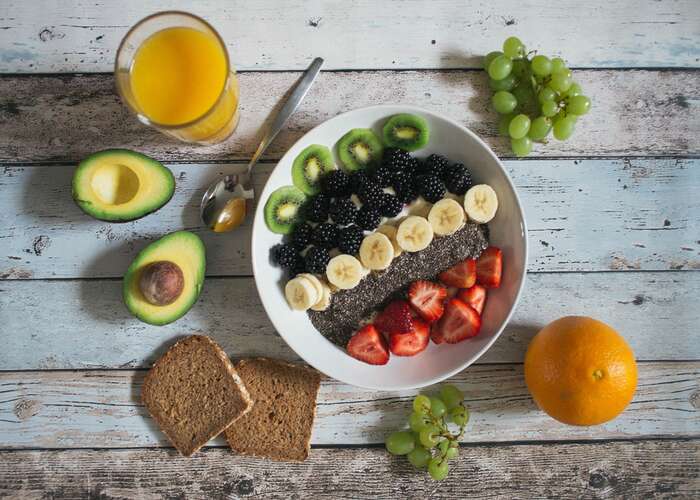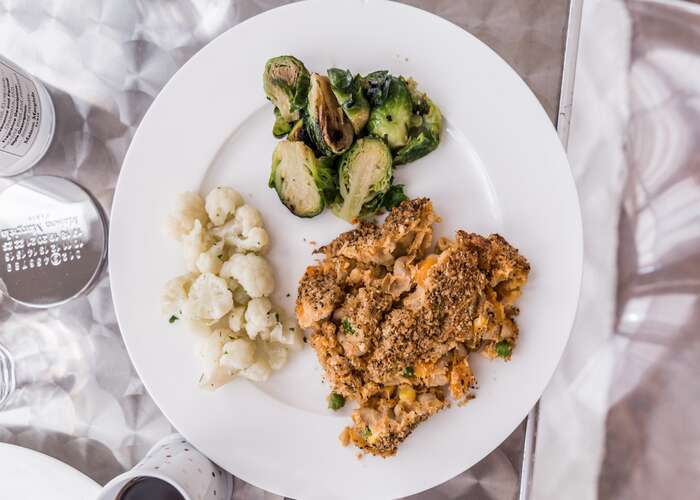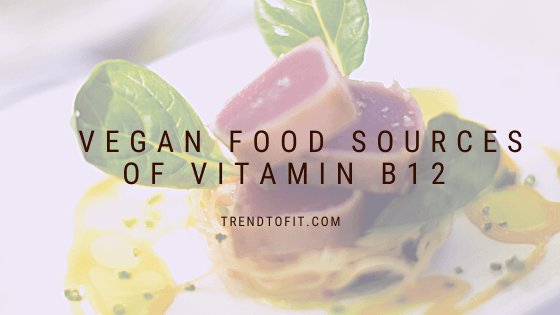Last updated on March 18th, 2024
Also known as cobalamin, Vitamin B12 is one of the most important vitamins that our body requires to function properly. Much to your surprise, this essential vitamin cannot be produced by the body. You need Vitamin B12 rich foods for that. Because this naturally occurring nutrient can only be derived through foods like fish, meat, and dairy products.
Our body requires vitamin B12 as it plays a pivotal role in maintaining health. This nutrient is essential to nourish the brain and nervous system and assist in forming red blood cells and DNA synthesis. In the absence of vitamin B12 in the diet, the body’s physical and mental health can be impacted adversely.
Vitamin B12 has remarkable health benefits for the body, like improving energy levels, preventing heart diseases, and enhancing memory function. However, the concern mainly arises for vegetarians and vegans as most vitamin B12 sources are animals based.
We understand the contribution is mainly to the planet involving a plant-rich diet. But studies reveal that almost 92% of vegans can be deficient in this vitamin.
So, what are the alternatives that make up for the loss? Favourably, the plant-eaters can look for some options in their grocery store.
Let’s have a glance at them in detail.
Vitamin B12 Rich Foods
1. Nutritional Yeast
(one of the best Vitamin B12-rich foods for vegans)
Vegans get a secret ingredient that they can sprinkle over their salads or craft vegan cheese alternatives. Yes, it is the nutritional yeast used by many vegans in their recipes.
It typically originates from a species of yeast known as saccharomyces cerevisiae, containing traces of vitamin B12.
Today, nutritional yeasts are cultivated from different sources, including whey, blackstrap molasses, and sugar beets. It’s a perfect option for vegans for being dairy and gluten-free.
However, these are light-sensitive, so avoid purchasing the clear packaging because the micro nutritional value will degrade. Also, heating and drying the yeast will render it ineffective.
One teaspoon (about 8 mcg of B12) is enough for your daily requirements. It is loaded with all the vitamins, minerals, and quality protein for your body’s requirements.
Related:
2. Seaweeds and Sea Vegetables

Seaweeds also known as sea vegetables, are a type of algae found beneath the sea surface. They are mostly found along the coastlines globally but are typically consumed more in Asian countries like Japan, Korea, and China. These are another rich source of vitamin B12 for vegans.
Nori or laver, sea algae commonly found in Japanese cuisines, have a high amount of vitamin B12, sometimes comprising 10-22 mcg per tablespoon. The best way to consume nori is in raw form because cooking or drying will reduce the levels of B12.
People in the senile age bracket and those with digestive disorders poorly consume this seaweed. However, if you wish to get the maximum vitamin B12, you have to consume it almost 10-20 times what people generally eat.
Moreover, you can benefit from the iodine content in nori, a micronutrient often lacking in vegan and vegetarian diets.
3. Mushrooms
(one of the best plant-based Vitamin B12-rich foods)
Mushroom is often loved for their fantastic taste, especially by vegans. Interestingly, the food offers you remarkable health benefits as it is loaded with essential vitamins, minerals, and antioxidants, making it a potential addition to the diet.
Now there are a few fungi species, like the shitake mushrooms, containing a significant amount of vitamin B12. The research essentially hints at dry shitake that can be incorporated into the regular diet, like roughly six tablespoons ( 3 ounces) per day.
Another one in the shroom category is cremini, believed to be an active source of vitamin B12. It’s mainly due to bacteria’s presence on the outer surface, which contributes to vitamin formation. Simply toss and saute these shrooms with other veggies to fulfil your requirements for B12.
4. Tempeh
(amongst good Vitamin B12 rich foods & an ideal substitute for meat)
Now, you can ideally substitute your meat requirements with a popular fermented soy-based product named tempeh. These are becoming quite prevalent in the markets for their potential benefits in aiding the digestive and gut processes.
Much to your surprise, vitamin B12 is not naturally found in soybeans. But it’s the fermenting that develops the bacteria producing the vitamin and makes it one of the best Vitamin B12 rich foods.
In fermented foods, you can typically find lactobacillus bacteria that have been shown to produce some vitamin B12. Tempeh is completely versatile for its multiple health benefits providing proteins, prebiotics, vitamins, and minerals.
Typically, tempeh is dry but has a chewy texture and a nutty taste. Doctors suggest including at least 20 single-ounce servings of healthy vitamin B12 levels in your diet.
So, make sure to get it tossed, sauteed, baked, or steamed to have a vibrant flavour in the dish.
5. Kimchi
In the list of fermented products, you can add a traditional South Korean dish called Kimchi. The food preservation method like pickling has salt-fermented vegetables prominently prepared from cabbage with seasoning of salt, sugar, chilli peppers, onions, garlic, and garlic.
It can also include various other vegetables like radish, cucumber, celery, spinach, carrot, eggplant, and bamboo shoots. It is also shown to have some amount of vitamin B12 though it’s significantly less.
Perhaps you need to have a bowl full of Kimchi to suffice for the daily allowance of the vitamin. However, being rich in beta-carotene and antioxidant compounds will keep a check on chronic ailments like heart disease, diabetes, and cancer.
6. Kombucha Tea
(a good Vitamin B12-rich beverage)
Kombucha is a fermented beverage popular in countries like China and Japan. The kombucha tea preparation entails using black or green tea with a symbiotic colony of bacteria and yeast.
Often you will notice a mushroom-like film developing on the surface, which is why it is also known as mushroom tea. At the time of fermentation, the yeasts break the sugar in the tea to release probiotic bacteria.
It has an extensive range of health benefits for keeping major diseases in control. This tea can contain a noticeable amount of vitamin B12. Regularly, consuming tea will provide some level of vitamin B12 in the body.
Also read,
7. Fortified Soy Milk
Fortified soy milk is a well-known replacement for regular dairy milk and can be a great inclusion in your diet. This flavorful beverage earlier came from the waste remains of tofu. However, now it’s renowned as a lactose-free substitute having some impressive health benefits.
Fortified soy milk is rich in vitamins, minerals, and antioxidants, especially vitamin B which upkeeps our nerve cells and DNA. It can also help you avoid anaemia contributing to fatigue and tiredness.
Generally, soy milk or liquids don’t contain vitamin B12, but these can be fortified. So, before purchasing, make sure you read the labels correctly.
Also, avoid having the ones sweetened and flavoured with artificial sugars. A single cup of soy milk is enough to produce a day’s worth of B12. You can also have it with your cereals, hot chocolates, and lattes.
8. Barley Grass
Green food nutrients like barley grass are known for their contribution to supporting healthy blood circulation in the body. It is the early and developing stage of the barley plant. All the essential minerals like iron, calcium, and others exist in barley greens.
The barley greens are equally enriched with vitamins, mainly vitamin B, which also incorporates B12. It can be consumed both in the power or juice form as a dietary supplement for vitamins and minerals.
Possibly, it will provide some amount of vitamin B12 in the body, but how much it’s still uncertain.
9. Fortified Bowls of Cereal

You might love eating cereals for your breakfast, but these food products can be a rich source of vitamin B12. Have your regular vitamin B12 by adding fortified cereals to your breakfast preparation menu.
The fortification of cereals implies that it enhances the particular level of nutrients and vitamins in the food. Try to have a serving per 100g of cereals to compensate for the amount of B12.
However, there can be misleading claims in the packages as these are mostly loaded with refined carbs and sugar. All these are harmful to health.
Ideally, pick fortified cereals low in sugar and high in fibre for a better intake of vitamin B12.
Vegan Vitamin B12 Supplements
Consuming vitamin supplements have been a topic of discussion for vegans and vegetarians. Luckily, you can find yourself covered with supplements that are entirely vegan and safe to consume. Primarily, the supplements are derived from bacteria and not animal-based sources.
There are various types of B12 supplements like cyanocobalamin, hydroxocobalamin, methylcobalamin, and adenosylcobalamin. These vitamins are mostly water-soluble, so it’s a fantastic option to pick.
Summary: Be Serious About Vitamin B12!
Your diet should typically balance all the recommended plant-based and vegan sources of vitamin B12. In case, you aren’t getting enough vitamin B12-rich foods, consider having vegan supplements.
However, it’s better to have words with the doctors to know the exact quantity of vitamin B12 that your body requires.
With a proper intake, you are most likely to overcome all sorts of deficiencies in your body. Remember, healthy life is directly proportional to a healthy diet.
You may consult your doctor If you are passing through a vitamin B12 deficiency problem then he/she would suggest taking some Vitamin B12 supplements which are fast-absorbing & Help Boost Your Immune System.
All the best!
Also read:
- 15 Best Ways to Make Your Bones Stronger
- 31 Health & Fitness Hacks
- 13 Ways to Detox Your Body
- 10 Disturbing Fast Food Facts Causing Health problems
- 100 Healthy Lifestyle Habits to Improve Your Health
DISCLAIMER: All suggested suggestions and supplements mentioned above are based on research. The content in this article is meant for spreading awareness and is not intended as a substitute for professional medical advice or treatment. It’s always better to seek the advice of your physician, nutritionist or another qualified healthcare provider with any question you may have regarding health advice.

Very informative, thanks for sharing !
🙂